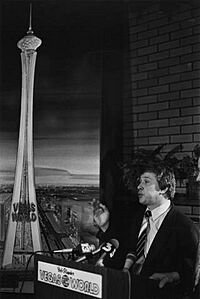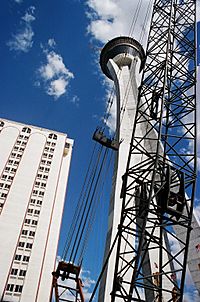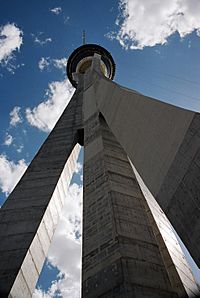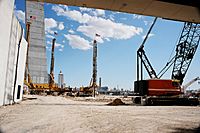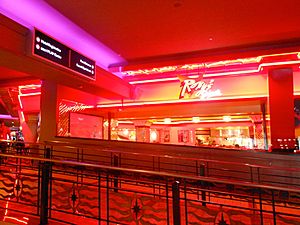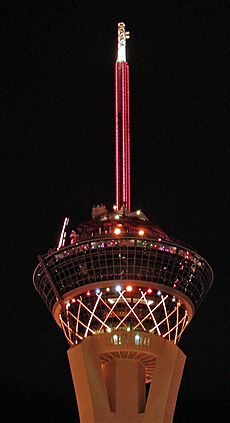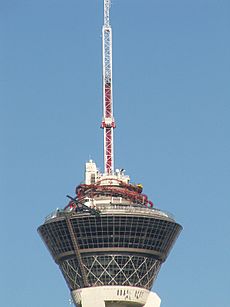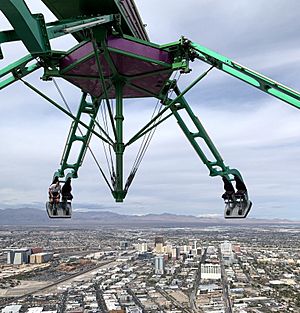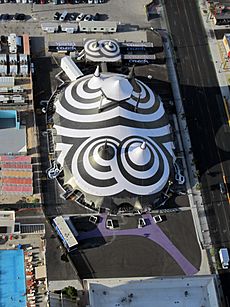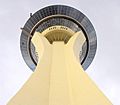The Strat facts for kids
Quick facts for kids The Strat Hotel, Casino and SkyPod |
|
|---|---|
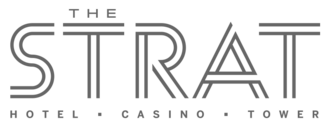 |
|
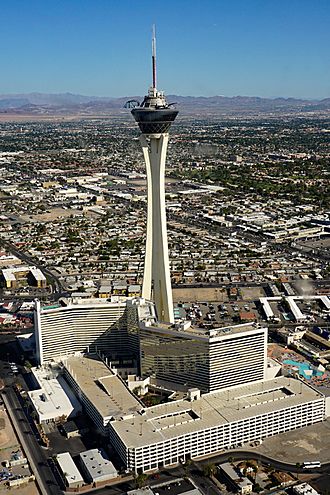
The Strat tower and resort in 2017
|
|
| General information | |
| Status | Operating |
| Type | Observation tower |
| Location | Las Vegas, Nevada, U.S. |
| Address | 2000 South Las Vegas Boulevard |
| Coordinates | 36°08′51″N 115°09′19″W / 36.147386°N 115.155389°W |
| Groundbreaking | November 5, 1991 |
| Construction started | February 1992 |
| Topped-out | November 4, 1995 |
| Opened | April 30, 1996 |
| Cost | US$70 million |
| Height | |
| Antenna spire | 1,149 ft (350.2 m) |
| Design and construction | |
| Architect | Ned Baldwin |
| Developer | Bob Stupak |
|
Other information
|
|
| No. of rooms | 2,427 |
| Total gaming space | 80,000 sq ft (7,400 m2) |
| Permanent shows | Viva Las Vegas (1996–2006) American Superstars (1996–2011) Bite (2004–12) Pin Up (2013–17) MJ Live Celstia |
| Signature attractions | |
| Notable restaurants |
|
| Casino type | Land-based |
| Owner | Golden Entertainment |
| Previous names | Vegas World (1979-1995) Stratosphere (1996-2020) |
| Renovated in | 2000–01, 2004, 2010–12, 2018–20 |
The Strat Hotel, Casino & Tower (also known as The Strat, and formerly the Stratosphere) is a famous hotel and casino in Las Vegas, Nevada, USA. It has a huge 1,149 ft (350.2 m) observation tower. This tower is the tallest in the United States and the second-tallest in the Western Hemisphere, only shorter than the CN Tower in Toronto, Ontario.
At the very top of the tower is a "skypod." This skypod has a revolving restaurant that slowly spins, along with cool lounges and observation decks where you can see amazing views. There are also several exciting thrill rides right on top of the tower! The hotel and casino parts are at the bottom of the tower. The resort also has a show theater and a shopping area. The Strat is on Las Vegas Boulevard, just north of the famous Las Vegas Strip. Even though it's very close, some official maps don't count it as part of the Strip because it's just inside the city limits.
Before The Strat, a hotel and casino called Vegas World was on this spot. Bob Stupak opened Vegas World in 1979. He first planned a giant neon sign for Vegas World. This idea soon grew into building a huge observation tower with a restaurant on top. Construction of the Stratosphere Tower began in February 1992. During construction, in August 1993, a fire broke out on the tower. Stupak then had trouble getting enough money to finish the tower. To complete the project, he teamed up with Grand Casinos, owned by his friend Lyle Berman.
The tower was first planned to be 1,012 ft (308 m) tall. But in 1994, Stupak wanted to make it even taller, 1,825 ft (556 m), to be the tallest freestanding structure in the world! The Federal Aviation Administration (FAA) didn't like this idea. The city eventually said no to the super-tall height. They allowed Stupak to build it up to 1,149 ft (350 m). Vegas World closed on February 1, 1995. Its hotel buildings were updated to become part of the Stratosphere hotel. New hotel towers were also built. The observation tower, which cost $70 million, was finished on November 4, 1995.
The entire Stratosphere complex cost $550 million and opened on April 30, 1996. Some parts, like a hotel tower and sections of the shopping mall, were not finished yet. The Stratosphere was built in an area that had some challenges. The resort had money problems during its first year. This was partly because it was a bit far from the main Strip resorts. Also, there wasn't much advertising at first. The unfinished parts of the resort also meant less money coming in.
Stratosphere Corporation had to file for Chapter 11 bankruptcy in January 1997. This meant they needed help to reorganize their money. Businessman Carl Icahn bought the resort in 1998. Icahn had the remaining hotel rooms finished in 2001. This was part of a $65 million update project. The resort started making money under Icahn's ownership. It focused on attracting visitors who wanted good value. In 2004, Icahn's company, American Casino & Entertainment Properties (ACEP), took over ownership.
In 2008, Whitehall Street Real Estate Funds bought ACEP and the Stratosphere. Two years later, ACEP spent $20 million to update the hotel rooms. More updates continued until 2012. Golden Entertainment bought ACEP and the Stratosphere in 2017. They started even more renovations in 2018, which finished in 2020. The resort was officially renamed The Strat on January 22, 2020.
Contents
History of The Strat
In 1974, Bob Stupak opened a small casino in Las Vegas. It was called Bob Stupak's World Famous Million-Dollar Historic Gambling Museum and Casino. It was located north of the Las Vegas Strip. The casino burned down two months later. Stupak then opened his Vegas World hotel and casino on the same land in 1979.
How The Strat Was Planned
The idea for the Stratosphere began when Stupak wanted to build a 1,012-foot (308 m) neon sign tower for Vegas World. In October 1989, he asked the city for permission. He soon changed his plans to include an elevator and an observation deck at the top. Stupak wanted the tower to be a famous landmark for Las Vegas. He compared it to the Eiffel Tower in Paris or the Empire State Building in New York.
Many people were against his plans. The city staff even tried to make a rule to limit signs to 35 feet tall. But the Las Vegas City Council rejected this rule. They thought it was just to stop Stupak's project.
In February 1990, Stupak showed his new plans. It was for a $50 million, 1,012-foot observation tower. The top floor would have a revolving restaurant and fancy suites. It would be the tallest building in Las Vegas and in Nevada. Ned Baldwin, who also worked on the CN Tower, designed it. Stupak was inspired by the Sydney Tower in Australia. In April 1990, the city council approved the tower. This was even though the Federal Aviation Administration (FAA) said it was 200 feet (61 m) too tall. Nellis Air Force Base also didn't like the tower.
In October 1991, the city approved the tower's base and shaft. But the pod at the top still needed approval. Stupak was trying to get money for the project, which now cost $100 million. The project was also planned to have the "world's first indoor African lion's park." This would be a jungle habitat at the tower's base. However, this idea was later dropped.
The official start of the project, called the Stratosphere Tower, happened on November 5, 1991.
Building The Tower
Construction of the $32 million tower began in February 1992. It was built next to Vegas World. Many experts watched the construction to make sure the tower was strong and safe. The tower was built in an area known as Meadows Village. This area had some challenges.
On August 29, 1993, a fire broke out on the half-finished tower. Hundreds of people at Vegas World were safely moved out. No one was hurt. The cause of the fire was never found. Parts of the tower looked burnt, but the fire didn't damage its structure. The tower is made of strong concrete and steel. The fire was expected to delay construction by about eight weeks.
After the fire, Stupak had trouble getting money to finish the tower. In November 1993, Grand Casinos announced they would buy part of the Stratosphere and Vegas World. This helped construction continue.
In April 1994, the tower was over 700 feet tall. Stupak then said he wanted to make the tower even taller, 1,825 ft (556 m). This would make it the tallest structure in the world. But the FAA and McCarran International Airport were against this. They said such a tall tower would change air traffic paths. In June 1994, the city said no to the new height. But they allowed it to be 1,149 feet tall, which was still taller than first planned.
Grand Casinos bought Vegas World at the end of 1994. The hotel-casino closed on February 1, 1995. Its 932 rooms were updated to become part of the Stratosphere. A month later, Stratosphere Corporation started selling bonds to raise money. They needed funds to finish the tower and pay Stupak for Vegas World.
The tower was officially finished with a ceremony on November 4, 1995. A helicopter helped lift the final heavy steel parts to the top.
Opening Day
The Stratosphere was expected to hire 3,000 people. They started hiring for the remaining 2,400 jobs in March 1996. At that time, Stupak was the chairman of Stratosphere Corporation.
Days before opening, on April 25, 1996, smoke in the tower's restaurant area caused workers to leave. It was from a faulty fan in the kitchen. The tower had water tanks for firefighters, but they weren't needed.
More than 8,000 special guests came for a party on April 29, 1996. This was hours before the midnight opening. Many important people attended, including Nevada governor Bob Miller. A six-minute fireworks show happened at 10:30 p.m. Smoke from the fireworks filled the tower's pod. This set off fire alarms and stopped the elevators. Hundreds of guests were stuck for a while.
The $550 million complex had 354,000 sq ft (32,900 m2) of space. This included 140,000 sq ft (13,000 m2) for entertainment and shopping. A 97,000 sq ft (9,000 m2) casino was part of the first phase. It also had 1,500 hotel rooms. The hotel was expected to open on May 7, 1996. Another 1,000 rooms were planned for November 1996.
The resort had 3,100 employees. The casino had 2,600 slot machines. It was decorated with a world's fair theme and bright colors. The Stratosphere had seven restaurants. The top of the tower had two thrill rides. Stupak said, "Anyone can build a tower. But if you build a tower and put a roller coaster on top - now, that's Las Vegatizing."
Changes and Updates
The Stratosphere hoped to attract at least 5.5 million visitors in its first year. But the first few weeks showed less money than expected. This was because parts of the resort were unfinished. Also, its location, away from the main Strip, was a challenge. Many people visited the tower but didn't stay to gamble in the casino.
Stupak resigned as chairman less than three months after opening. He had disagreements with the other board members. After he left, his statue was removed from the property.
In August 1996, the second phase of the resort was stopped due to money problems. This included an unfinished 15-story hotel building. There were also plans for a $30 million aquarium, but it never happened. Within six months, the resort laid off 400 employees. To attract more gamblers, the casino offered better odds. They also lowered prices for the tower and its rides. A roller coaster at the top was closed for updates to make it better.
In January 1997, the resort filed for Chapter 11 bankruptcy. This meant they couldn't pay some debts. The resort continued to operate during this time.
New Owners and Renovations
In June 1997, businessman Carl Icahn bought a large part of the Stratosphere's debt. He then planned to buy the entire resort. Icahn's plan was approved, and the Stratosphere came out of bankruptcy in October 1998. Icahn planned $100 million in updates, including finishing the extra hotel rooms.
In 1999, ownership changed to American Real Estate Partners, with Icahn still in charge. A new sportsbook was added that year. The resort's money situation improved in 2000. About 8,000 people visited the tower daily.
Construction on the unfinished hotel tower started again on April 14, 2000. This tower, with 24 stories, was finished on November 2, 2000. The $65 million project added 1,002 rooms. It also included a 67,000 sq ft (6,200 m2) pool area and a coffee shop. These new parts opened in mid-2001. Icahn wanted the Stratosphere to attract visitors looking for good value. By focusing on this, he made the Stratosphere a successful business.
In 2004, Icahn's new company, American Casino & Entertainment Properties (ACEP), took over the Stratosphere. Updates were made to its sign and entrance.
In April 2007, Icahn announced he would sell ACEP and its properties. Goldman Sachs bought them in February 2008. The new owners planned to spend $25 million on updates. A $20 million renovation project began in 2010. This included updates to the casino, entrance, and the Top of the World restaurant. Many of the 2,427 hotel rooms were also updated.
For years, the Stratosphere was the only big resort in its area. When the nearby Sahara closed in 2011, it meant fewer people walking by the Stratosphere. But the Sahara reopened as the SLS Las Vegas in 2014. This was good for the Stratosphere, as more visitors came to the area.
In June 2017, Golden Entertainment bought ACEP, including the Stratosphere. In March 2018, Golden Entertainment announced a $140 million renovation plan. They wanted more people to know that the Stratosphere was a full resort, not just a tower. Renovations began later in 2018. A new gaming area was added, and 300 rooms were updated.
On February 1, 2019, it was announced that the resort would be renamed The STRAT Hotel, Casino and SkyPod. "The Strat" had been a local nickname for years. The official name change happened on January 22, 2020. Nevada governor Steve Sisolak and other famous people attended the celebration. Most renovations were finished by then. Half of the resort's 2,427 hotel rooms had been updated. The 80,000 sq ft (7,400 m2) casino was also updated with new colors and an open design. Four new restaurants were added. These updates aimed to keep visitors who usually only went to the tower. They also helped the resort compete with other nearby places.
What You'll Find at The Strat
The hotel and casino are at the bottom of the tower. Besides the restaurant at the top, there are many other places to eat. These include a buffet and a steakhouse called McCall's Heartland Grill. Roxy's Diner has been open since the resort first started.
In late 2023, The Strat plans to open Atomic Range. This will be a four-story, 99,000 sq ft (9,200 m2) golf entertainment place. It's being built on seven acres of land next to the resort.
The Strat's exact location in relation to the Las Vegas Strip has been discussed. When it opened in 1996, it said it was "the top of the Strip." Some people think it's part of the Strip, even though it's inside the city limits. However, Clark County officially says the Strip doesn't go into the city limits. Still, Golden Entertainment advertises The Strat as a Strip property.
The Observation Tower
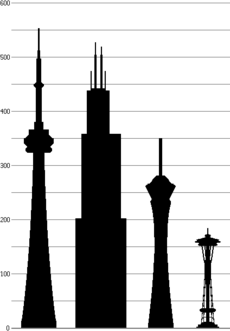
• Willis Tower (formerly Sears), Chicago
• Stratosphere, Las Vegas
• Space Needle, Seattle
The resort was named after the stratosphere, a layer in Earth's atmosphere. This refers to how tall the tower is. At 1,149 ft (350 m), it's the tallest freestanding observation tower in the United States. It's the second-tallest in the Western Hemisphere, after the CN Tower in Toronto. It's also the tallest tower west of the Mississippi River. Because it's not fully lived in, it's not called a "building" by some groups. The tower is so tall that it helps drivers find their way in Las Vegas. It also makes things a bit tricky for air traffic controllers, who have to guide planes around it.
The tower is very popular with tourists and is a famous part of the Las Vegas skyline. The top of the tower has two observation decks and a restaurant called "Top of the World." It also has lounges, four thrill rides, and a wedding chapel. The "Top of the World" restaurant slowly spins, taking about 80 minutes for a full turn. It's on the 106th floor and gives amazing views of Las Vegas. An indoor observation deck is on the 108th floor. It has food and drinks. Stairs lead up to an outdoor deck on the 109th floor. Both decks offer wide views of the city. The indoor deck was updated in July 2019.
The tower's elevators are very fast, traveling at 1,801 feet per minute. The tower also has 1,455 steps up to the 108th floor, which is 855 feet high. Since 2009, the tower has hosted a fundraising event called Scale the Strat. People race up the stairs to raise money for the American Lung Association. The stairs are usually closed to the public.
The tower cost $70 million to build. It weighs about 50,000 tons and has almost 290 miles of steel bars inside. The tower's pod, where the restaurant is, has 12 stories. The outside of the pod has lights that change between eight different colors. A 149-foot needle is on top of the pod.
During its construction, the tower received some negative awards from the Las Vegas Review-Journal. It was called the "worst Las Vegas eyesore" and the "community's biggest embarrassment." In 2006, readers voted it the ugliest building in Las Vegas.
Exciting Rides
The Strat has some thrilling rides:
- Big Shot: This ride opened with the resort in 1996. It shoots riders up and down the tower's needle. At 1,081 ft (329 m), it was once the highest thrill ride in the world.
- X-Scream: Opened in 2003, this ride is 866 ft (264 m) high. It's the fourth highest thrill ride in the world. A car rolls back and forth on a track that hangs over the tower, tilting up and down like a see-saw.
- Insanity: This ride opened in 2005. At 900 ft (270 m), it's the third highest thrill ride in the world. It dangles riders over the edge of the tower and spins them in a circle at about 40 miles per hour. Once, it stopped due to strong winds, leaving riders hanging for a while.
- SkyJump Las Vegas: Opened in 2010, SkyJump is like bungee jumping. Riders fall 855 ft (261 m) while attached to a special wire. It's a controlled descent.
A previous ride was a roller coaster called the High Roller. It opened in 1996 and went around the top of the tower pod. It closed on December 30, 2005. Many people thought it wasn't very exciting compared to other rides. However, it was popular and had almost 4 million riders before it closed. At 909 ft (277 m), it was the second highest ride in the world and the highest roller coaster at the time.
Two other rides were planned for the tower but were never built. One was a "King Kong" ride where riders would be in a giant mechanical gorilla. The other was a roller coaster that would go over Las Vegas Boulevard. Both ideas faced opposition from local residents due to concerns about noise and traffic. The city council did not approve them.
Tower Shops
The Tower Shops is a shopping mall on the second level of the resort. The elevators that go up to the observation decks can only be reached through this mall.
When the Stratosphere opened in April 1996, the shopping area was still being built. It had vendor carts with different themes like Chinese, French, and Manhattan. The second phase of the mall was stopped in August 1996 due to the resort's money problems. This left the mall with 69,000 sq ft (6,400 m2) of shopping space.
By February 1997, 32 out of 45 stores were open. By October 1997, there were 36 stores. About 85 percent of the shopping space was being used.
In 2000, Stratosphere Corporation bought the mall. In 2004, the Tower Shops had 110,000 sq ft (10,000 m2) of space. That year, they planned to add another 80,000 sq ft (7,400 m2) of retail space. The mall had about 50 stores and 15 carts at that time.
Live Entertainment
When it opened, The Stratosphere had the 700-seat Broadway showroom and a 300-seat lounge called Images Cabaret. A show called American Superstars, featuring celebrity impersonators, started in the lounge. Danny Gans also performed in the showroom. He left at the end of 1996 after disagreements about advertising. American Superstars then moved into the showroom.
A smaller afternoon show, Viva Las Vegas, opened in the Broadway showroom in October 1996. Hypnotist Marshall Sylver opened a show in Images Cabaret in 1997. Two years later, Images Cabaret moved to a new spot.
By 2001, Viva Las Vegas was the longest-running afternoon show in Las Vegas. An outdoor stage, the Outdoor Events Center, opened later that year. It had seats for about 3,600 people. It hosted lower-priced events like boxing matches and music shows. Viva Las Vegas closed in December 2006.
American Superstars closed in March 2011 after 15 years. It was one of the longest-running shows in Las Vegas. Later that year, singer Frankie Moreno started a two-year performance. The showroom was updated and renamed the Stratosphere Showroom. Bite ended its run in 2012.
In 2013, David Perrico and his band Pop Evolution started a monthly show. Claire Sinclair starred in a burlesque show called Pin Up, which ran for four years. By 2016, the resort started offering a Michael Jackson tribute show called MJ Live.
The Strat added an acrobatic show, Celestia, in June 2019. The show was performed inside a 30,000 sq ft (2,800 m2) tent outside The Strat. Celestia closed two years later. The Strat then planned to update its 600-seat theater. They wanted to become a well-known place for live entertainment. Illusionist Xavier Mortimer opened a magic show on July 1, 2021. Another magic show by mentalist Banachek opened a month later. A concert series by Sammy Hagar also took place later in 2021.
Images for kids
See also
 In Spanish: Stratosphere Las Vegas para niños
In Spanish: Stratosphere Las Vegas para niños
- Landmark (hotel and casino), a similar Las Vegas property
 | Valerie Thomas |
 | Frederick McKinley Jones |
 | George Edward Alcorn Jr. |
 | Thomas Mensah |


